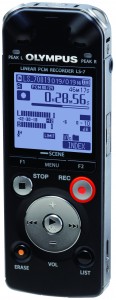How many times has this happened to you?
Your band is rehearsing. You record, but the quality from your low-end digital recorder is so poor that the playback is inaudible. The recorder was cheap and so is its one microphone.
You’re late for class and must take a seat in the back of the room. Professor Mile-A-Minute-Monotone drones on from what seems like miles away while you struggle to take notes.
You’re on a business trip, doing onsite interviews in a noisy room, juggling brochures, EPKs and a notebook in one hand and a pen in the other while trying to keep up with your subject as he walks from display to display.
You’re doing a telephone interview and your subject is on a mobile phone, on the road, chattering away while you scramble to scribble in the hopes of remembering what the heck you just wrote when it’s time to come back.
You’ve tried recording lectures on a small digital recorder, but you can’t see the buttons in the dark.
If only you had a compact, high-quality, multi-microphone digital recorder to capture everything we just described and even walk you through its operational steps. Thanks to Olympus, now you do. The new LS-7 Linear PCM recorder is a small, powerful, multi-featured must-have for anyone with on-the-go recording needs. Rick Sasserath, Technical Administrator at Olympus, spoke to Planet Ill about this new and noteworthy device.
Planet Ill: The LS-7 is the next step up from previous recorders in the LS line. How did you select the features to add to the series? Were these decisions based strictly on R&D or did you also receive customer feedback requesting these features?
Rick Sasserath: We want to cater to the needs of our customers, and one of the most important things about the LS-7 is that it enables a lighter, more compact PCM [pulse-code modulation], as well as the opportunity to have wonderful audio quality. For $200 you get less bass roll-off, three mics instead of two, and more audio capabilities. Electronics nowadays evolve so rapidly. We want to keep things as professional as possible while in a smaller package. The LS-7 is compact, but it has everything you could want in a PCM within the LS series. Particularly within the music industry, compact size is important for taking up less space in your gear bag or being able to fit in your pocket to record a performance.
Planet Ill: The LS-7 has less memory. How expandable is it?
Rick Sasserath: The internal memory is smaller, but with an SD card you can go to 32 gigabytes and record PCM audio up to 11 hours with better quality because of the additional microphone.
Planet Ill: How user-friendly is the LS-7 and who is the target customer? In addition to musicians, who else can benefit from the LS-7? For example, it’s more than a student needs in order to record classroom lectures, but for classes held in lecture halls, it seems to be a good investment.
Rick Sasserath: For ease of use, a musician probably won’t need to read the manual. In a lecture hall, a zoom mic is always available with LS models, but if you’re not familiar the settings, it won’t make sense. In this device, you can see where it picks up, and you can hone in and see the space between you and the lecturer.
Planet Ill: For musicians, what are some of the specialized features that put the LS-7 ahead of other recorders?
Rick Sasserath: Clearly, the PCM quality is the biggest improvement. It’s more about usability. For the novice musician, a lot of recorders are intimidating to look at. The LS-7 is not. There is also a pre-record feature, so if you miss the beginning of a song or speech, you have the ability to get that sound bite. A buffer runs, you hit “play” and it cuts a couple of seconds before the play button hits.
Planet Ill: An important feature we should mention is Voice Guidance. In this case, the LS-7 would again be advantageous in a classroom setting, particularly for visually impaired students. How does this feature work?
Rick Sasserath: This feature is for people with sight disabilities or no access to look at the recorder. It walks you through the settings, recording and editing inside the recorder itself. Olympus is committed to this technology. We are a leader in voice guidance for the blind or dyslexic. This feature can literally guide you through every function of the recorder. We are also trying these devices with Dragon, the voice recognition software that converts audio to text. Historically, Olympus has created the most compatible audio devices for Dragon software.
Planet Ill: The LS-7 also accepts an external microphone. In which situations would this be recommended? Also, how does it record telephone conversations?
Rick Sasserath: One reason in particular for an external mic, outside of music, is ambient recording in nature. The other situation would be for podcasting or when using the LS-7 for interviews. For recording both sides of a telephone interview, you would connect it via the TP-7 to your phone. That said, the pickup on the LS-7 is amazing, so you can put your phone on speaker and record. You can also set the LS-7 to “monitor” mode and use it as a microphone or extended mic.
Planet Ill: The LS-7 is battery-powered. What types of batteries are required?
Rick Sasserath: The LS-7 runs on three AAA batteries, which are rechargeable. You can purchase any type of batteries; you don’t have to be company-specific with brand. They can also recharge via USB while transferring recordings into your computer.
Planet Ill: Let’s look at Olympus’ place in the market and your customer service, which is key when making any purchase. Consumers vote with their money. Why should you get their vote?
Rick Sasserath: Olympus has really been in the forefront of innovation since the 1960s, and remaining ahead with innovation is the key. For Olympus, it’s not about, “This is cool; let’s design it.” It’s about audience needs and making modifications around what the market asks for. Audio is only a portion of what Olympus does, and we make these wonderful devices that are easy to use. You can plug them in and go through the menus easily. We are always there for our customers, and we have three repair facilities between the U.S. and Canada for any item we make. We also use social media to communicate with our customers and we monitor for keywords. If we see “Olympus” and “problems,” we’re on the issue. I came from customer service, and we pride ourselves on our ability to make customers happy.
For more information, visit www.olympusamerica.com/cpg_section/product.asp?product=1547
Elianne Halbersberg is a freelance writer whose work has been published by Guitar Edge, Mix, Premier Guitar, Gibson.com, Electronic Musician, Audio Media, Ink 19 and numerous other magazines and websites.
Follow Us on Twitter @ http://twitter.com/planetill
Join Us on the Planet Ill Facebook Group for more discussion
Follow us on Networked Blogs






Rick stated in this interview that the LS-7 takes 3 AAA batteries, from all other research I’ve done the LS-7 only requires 2 AAA batteries. 2 rechargeable AAA’s are included in the box.